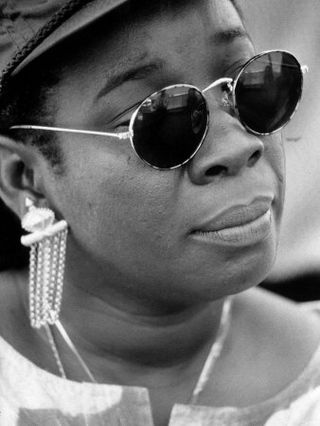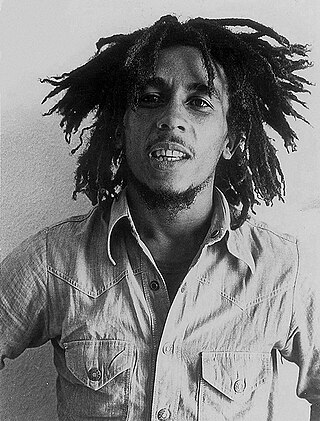
Exodus is the ninth studio album by Jamaican reggae band Bob Marley and the Wailers, first released in June 1977 through Island Records, following Rastaman Vibration (1976). The album's production has been characterized as laid-back with pulsating bass beats and an emphasis on piano, trumpet and guitar. Unlike previous albums from the band, Exodus thematically moves away from cryptic story-telling; instead it revolves around themes of change, religious politics, and sexuality. The album is split into two halves: the first half revolves around religious politics, while the second half is focused on themes of making love and keeping faith.

Catch a Fire is the fifth studio album by the reggae band The Wailers, released in April 1973. It was their first album released by Island Records. After finishing a UK tour with Johnny Nash, they had started laying down tracks for JAD Records when a disputed CBS contract with Danny Sims created tensions. The band did not have enough money to return to Jamaica, so their road manager Brent Clarke approached producer Chris Blackwell, who agreed to advance The Wailers money for an album. They instead used this money to pay their fares back home, where they completed the recordings that constitute Catch a Fire. The album has nine songs, two of which were written and composed by Peter Tosh; the remaining seven were by Bob Marley. While Bunny Wailer is not credited as a writer, the group's writing style was a collective process. For the immediate follow-up album, Burnin', also released in 1973, he contributed four songs. After Marley returned with the tapes to London, Blackwell reworked the tracks at Island Studios, with contributions by Muscle Shoals session musician Wayne Perkins, who played guitar on three overdubbed tracks. The album had a limited original release under the name The Wailers in a sleeve depicting a Zippo lighter, designed by graphic artists Rod Dyer and Bob Weiner; subsequent releases had an alternative cover designed by John Bonis, featuring an Esther Anderson portrait of Marley smoking a "spliff", and crediting the band as Bob Marley and the Wailers.

Third World is a Jamaican reggae fusion band formed in 1973. Their sound is influenced by soul, funk and disco. Although it has undergone several line-up changes, Stephen "Cat" Coore and Richard Daley have been constant members.

Bob Marley and the Wailers were a Jamaican ska, rocksteady and reggae band. The founding members, in 1963, were Bob Marley, Peter Tosh, and Bunny Wailer.
Joseph Benjamin Higgs was a reggae musician from Jamaica. In the late 1950s and 1960s he was part of the duo Higgs and Wilson together with Roy Wilson. He was a popular artist in Jamaica for four decades and is also known for his work tutoring younger musicians including Bob Marley and the Wailers and Jimmy Cliff.

Alfarita Constantia "Rita" Marley OJ OD is a Cuban born Jamaican singer-songwriter and entrepreneur. She is the widow of reggae legend Bob Marley. Along with Marcia Griffiths and Judy Mowatt, Rita was a member of the reggae vocal group the I Threes, the backing vocalists for Bob Marley and the Wailers.
The Electric is a four wall line dance. Choreographer and dancer Richard L. "Ric" Silver claims to have created the dance in 1976.

Judith Veronica Mowatt, is a Jamaican reggae artist. As well as being a solo artist, from 1974 she was also a member of the I Threes, the trio of backing vocalists for Bob Marley & The Wailers.
"Electric Boogie" is a dance song written by Bunny Wailer in response to his hearing the Eddy Grant song "Electric Avenue" in 1982. The song provided the basis for the success of dance fad called Electric Slide.

The Mighty Diamonds were a Jamaican harmony trio, recording roots reggae with a strong Rastafarian influence. The group was formed in 1969 and were best known for their 1976 debut album, Right Time, produced by Joseph Hoo Kim, and the 1979 release, Deeper Roots.

Marcia Llyneth Griffiths is a Jamaican singer best known for the 1989 remix of her single "Electric Boogie", which serves as the music for the four-wall "Electric Slide" line dance. It is the best-selling single of all time by a female reggae singer.
Kenneth Neville Anthony Garrick was a Jamaican graphic artist and photographer who was based in Los Angeles. He was a graduate of the University of California, Los Angeles (UCLA). He is best known as Bob Marley's art director and is responsible for many of the iconic designs associated with the reggae movement in the 1970s and 1980s.

Robert Nesta Marley was a Jamaican singer, songwriter, and guitarist. Considered one of the pioneers of reggae, he fused elements of reggae, ska and rocksteady and was renowned for his distinctive vocal and songwriting style. Marley increased the visibility of Jamaican music worldwide and made him a global figure in popular culture. He became known as a Rastafarian icon, and he infused his music with a sense of spirituality. Marley is also considered a global symbol of Jamaican music and culture and identity and was controversial in his outspoken support for democratic social reforms. Marley also supported the legalisation of cannabis and advocated for Pan-Africanism.

Dwight Pinkney OD, also known as Brother Dee, is a Jamaican guitarist best known for his work as a session musician and as a member of Zap Pow and the Roots Radics, who since 1999 has recorded as a solo artist.

Fitzroy Edwards, better known by his stage name Edi Fitzroy, was a Jamaican reggae singer, active from 1975 but best known for his work during the dancehall era.

Time Will Tell: A Tribute to Bob Marley is an album by Bunny Wailer, released through Shanachie Records in 1990. In 1991, the album won Wailer the Grammy Award for Best Reggae Recording.
Nadine Sutherland OD is a Jamaican reggae singer whose early career was nurtured by Bob Marley. She went on to become a successful dancehall artist in the 1990s.

William Alexander Anthony "Bunny Rugs" Clarke, OD, also known as Bunny Scott, was the lead singer of Jamaican reggae band Third World as well as a solo artist. He began his career in the mid-1960s, and was also at one time a member of Inner Circle and half of the duo Bunny & Ricky.

Neville O'Riley Livingston, known professionally as Bunny Wailer, was a Jamaican singer-songwriter and percussionist. He was an original member of reggae group The Wailers along with Bob Marley and Peter Tosh. A three-time Grammy Award winner, he is considered one of the longtime standard-bearers of reggae music. He was also known as Jah B, Bunny O'Riley, and Bunny Livingston.

Winston Hubert McIntosh, professionally known as Peter Tosh, was a Jamaican reggae musician. Along with Bob Marley and Bunny Wailer, he was one of the core members of the band the Wailers (1963–1976), after which he established himself as a successful solo artist and a promoter of Rastafari. He was murdered in 1987 during a home invasion.















